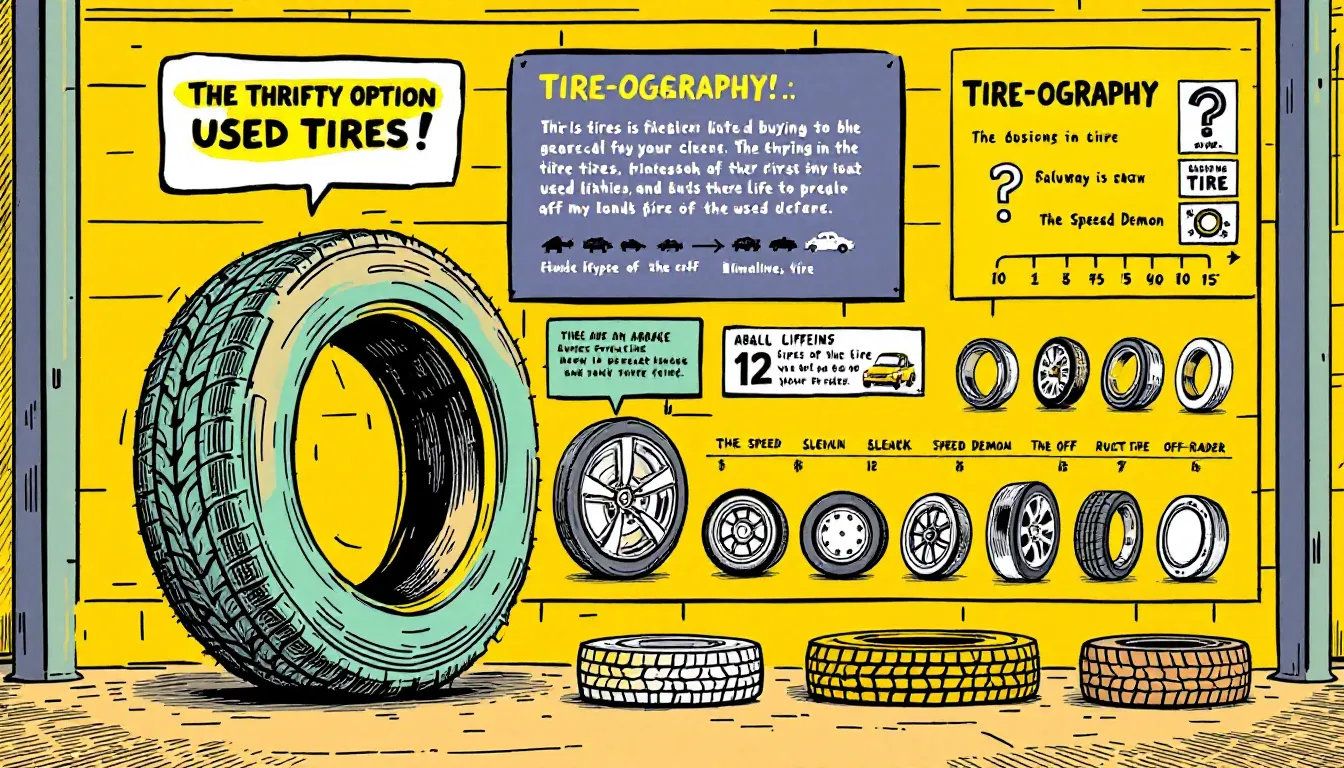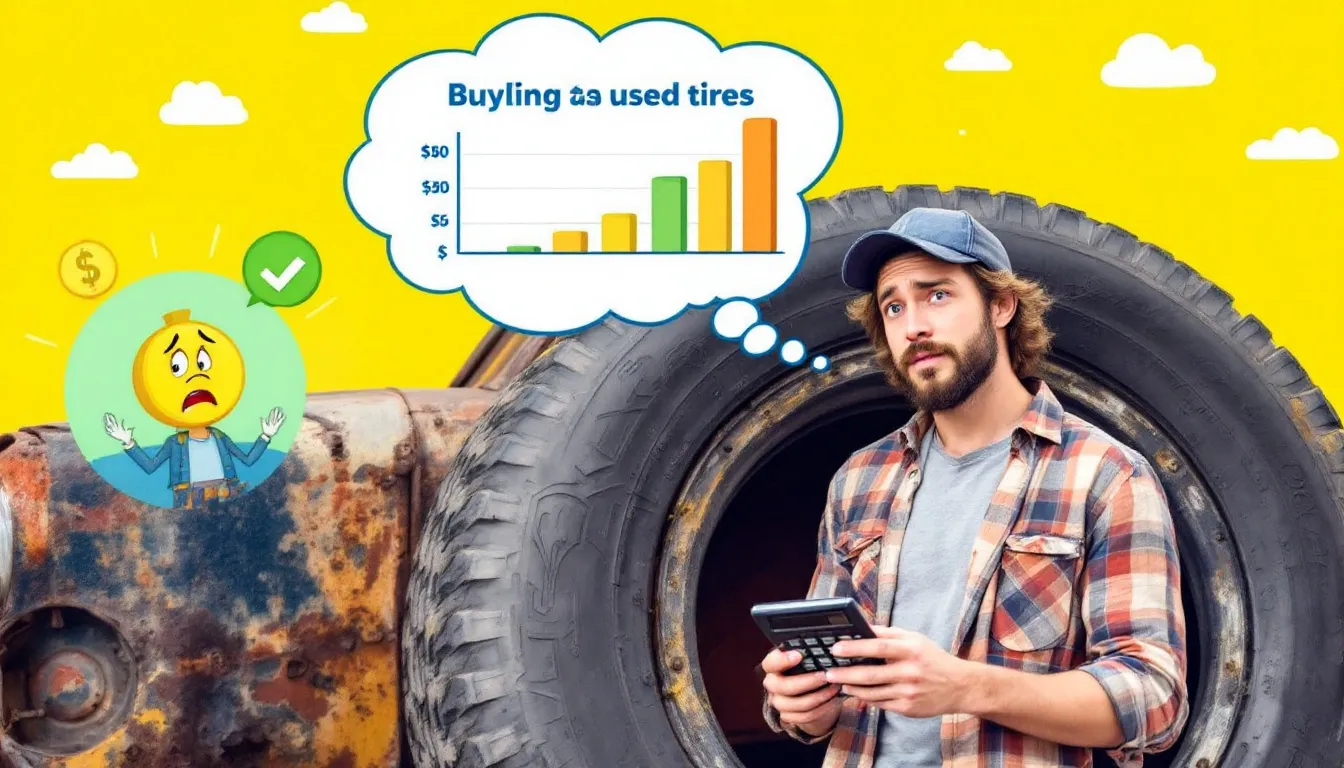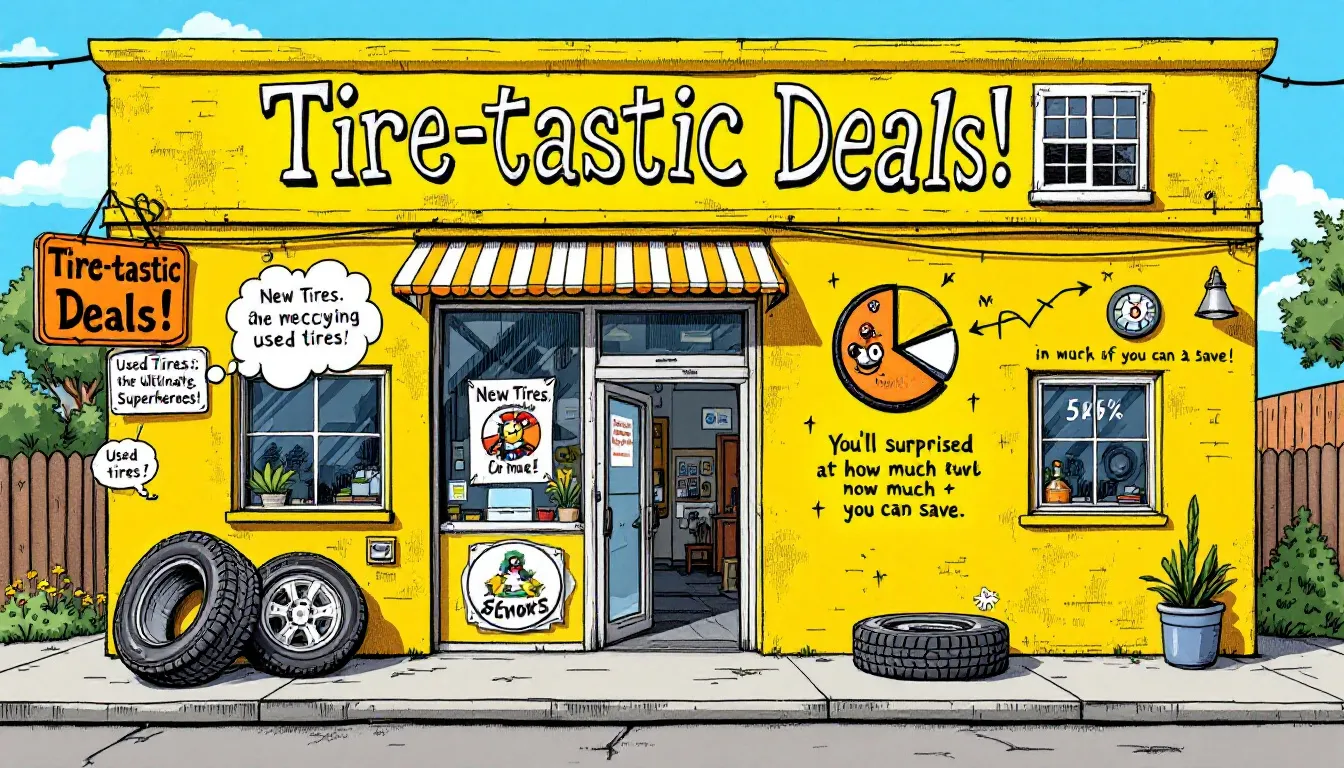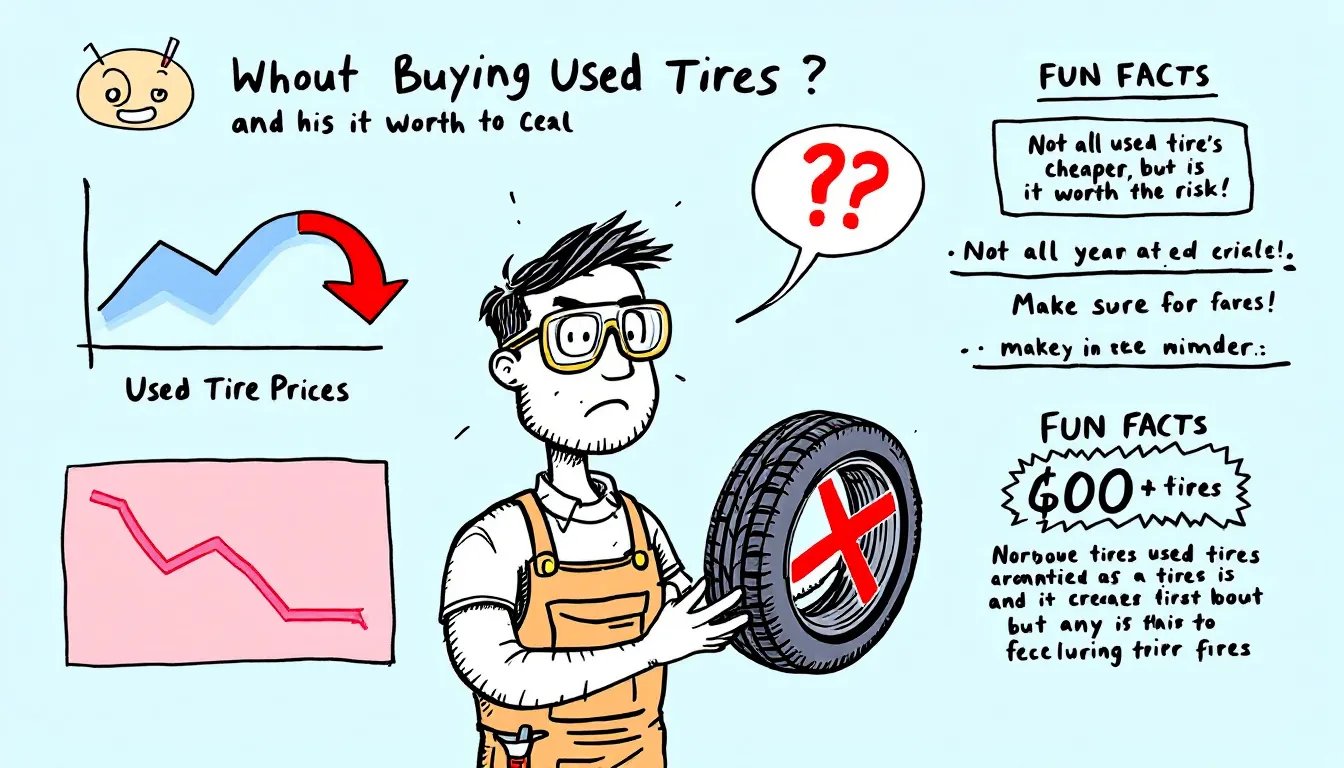Curious about how much are used tires? Typically, they range from $25 to $150. Factors such as brand, tread depth, and condition can influence the cost. This article will explain these factors and guide you through making a smart purchase. In this article, we’ll explore the various types of tires available, the price ranges you can expect, and important considerations for safely buying and using previously owned tires.
Key Takeaways
- Used tire prices vary based on brand, tread depth, and condition, so knowing what to look for can save you money.
- You can generally expect to pay between $25 and $200 for used tires, depending on type and condition, with passenger tires being the most affordable.
- Buying used tires not only saves you cash but is also environmentally friendly, helping to reduce waste and promote sustainability.
- A diverse selection of used tires is available, including all-season tires, which offer versatility for different driving conditions and are a great option for those needing replacements on a budget.
Factors Influencing Used Tire Prices

When it comes to buying used tires, several factors influence the price you’ll pay. Brand reputation, tread depth, and overall condition are just a few aspects that can cause prices to vary significantly. Knowing these factors aids in making informed decisions and getting the best value for your money. Every used tire should be inspected closely to ensure safety and reliability.
One of the biggest determinants is the brand and model of the tire. Premium brands often command higher prices due to their reputation for quality and performance. The tread wear and condition of the tire are also significant. Tires with minimal wear and good overall condition are typically priced higher because they offer better traction and safety.
Another important factor is the size and type of the tire. Larger tires, such as those for trucks or off-road vehicles, can be more expensive due to higher manufacturing costs and greater demand. These variables provide a clearer idea of what to expect when shopping for used tires.
Brand and Model
The brand and model of a tire significantly impact its price in the used tire market. Premium brands, known for their quality and performance, often fetch higher prices. For example, used truck tires from high-end brands can range from $100 to $300, reflecting their durability and reputation. Additionally, newer tires, even when used, can offer enhanced safety and performance, making them a valuable option.
Tread Wear and Condition
Treadwear and overall condition are crucial factors when pricing used tires. Tires with greater tread depth generally offer better traction and safety, making them more expensive. Well-maintained tires with minimal wear are often evaluated rigorously and priced higher than those with significant wear. It is also important to match the condition of replacement tires to the wear on the vehicle’s other tires to maintain balance and performance.
Tire Size and Type
The size and type of the tire significantly influence its cost. Larger tires, like those for trucks or off-road vehicles, are typically more expensive due to higher manufacturing costs and demand.
Many sizes are available to accommodate different vehicles and driving needs, ensuring there’s a suitable option for everyone. Additionally, used performance tires offer an appealing option for car owners looking to upgrade or replace tires at a lower cost, especially for those seeking high-performance options.
Typical Price Range for Used Tires

The cost of used tires can vary widely depending on their type and condition. Generally, you can expect to pay anywhere from $25 to $150 for used tires, with premium options reaching higher prices. Understanding these ranges will help you budget effectively and set realistic expectations when shopping. Used tires are also a cost-effective option for those in need of replacement tires.
Passenger tires, for instance, typically cost between $30 and $100, depending on their condition and brand. Truck tires, known for their robust construction, generally range from $50 to $200. Terrain tires, designed for off-road conditions, can cost between $60 and $200, reflecting their specialized design and functionality.
Being aware of these price ranges can help you find the right tires without overspending. Next, we’ll explore the specific costs for each type of tire.
Passenger Tires
Opting for used passenger tires can result in substantial savings, often reducing tire expenses by up to 50% compared to new tires. Prices for used passenger tires typically fall between $30 and $100, making them an economical choice for many drivers.
Truck Tires
Used truck tires generally range from $50 to $200, reflecting their robust construction and wear resistance. These tires are built to handle heavier loads and more demanding driving conditions, making them a durable and cost-effective option for truck owners.
Terrain Tires
Terrain tires are typically priced higher than standard tires due to their specialized design for off-road conditions. Used terrain tires can cost between $60 and $200, depending on their condition and brand.
These tires are engineered for optimal traction on uneven surfaces, making them essential for off-road vehicles.
Benefits of Choosing Used Tires

Opting for used tires offers numerous benefits, making them a smart and practical choice for many drivers. Not only do they offer substantial cost savings, but they also contribute positively to the environment and provide a wide selection to meet various needs. Used tires are a cost-effective option for those in need of replacement tires.
A major advantage of buying used tires is the cost savings. Specialty tires, like performance or off-road tires, can be expensive when bought new. However, opting for used versions of these specialty tires can lead to considerable savings while still retaining functionality.
Besides cost savings, buying used tires is an environmentally friendly choice. By purchasing used tires, consumers help reduce waste and promote the sustainable use of resources. Furthermore, the wide availability of used tires makes it easier to find the right fit for various vehicle types and sizes.
Cost Savings
Choosing used tires can lead to significant cost savings compared to new tires. Specialty tires, such as performance or all-terrain tires, often come with a higher price point due to their specific design and functionality, which can include expensive tires.
However, purchasing these specialty tires can offer considerable savings while still retaining their core benefits. Additionally, used tires are a cost-effective option for those in need of replacement tires.
Environmental Impact
Purchasing used tires is an environmentally friendly choice as it promotes a more sustainable use of resources. By opting for used tires, consumers help reduce the number of discarded tires in landfills, minimizing waste and lowering the carbon footprint associated with the production of new tires.
Availability
There is often a broad range of used tires available, catering to various vehicle types and sizes. Many used tire retailers maintain a diverse used tire inventory, making it easier for consumers to find tires suited to specific vehicles without waiting for special orders or shipments.
Where to Buy Quality Used Tires

Finding the right place to buy quality used tires ensures you get a good deal and reliable products. There are several options available, including local tire shops, online retailers, and specialized used tire dealers. Each option has its unique advantages, making it easier to find the right fit for your needs.
Local tire shops offer a level of service and attention that larger retailers often can’t match. The staff at these shops are usually highly knowledgeable and can offer personalized recommendations based on your vehicle’s needs. Shopping locally allows for immediate purchase and installation, so you can drive away with your new or used tires the same day.
Online retailers let you browse from home without the pressure of salespeople. You can easily compare prices and conditions of tires across multiple retailers, often finding specialized or rare used tires that local shops may not carry.
Local Tire Shops
Local tire shops offer a level of service and attention that larger retailers often can’t match. The staff at these tire shops are typically highly knowledgeable, offering personalized recommendations based on your vehicle’s needs. Many local shops also provide installation services on-site, making the entire process more convenient for customers.
Online Retailers
Purchasing used tires online offers the convenience of browsing from home without the pressure of salespeople. Online platforms usually feature user-friendly interfaces that simplify the shopping experience, and customers can easily compare prices and conditions of tires across multiple retailers.
Specialized Used Tire Dealers
Specialized used tire dealers often prioritize safety and reliable products, which can be confirmed through customer reviews. Evaluating customer feedback is a great way to discern the reliability of a used tire dealer, ensuring a quality buying experience.
Ensuring Used Tires Are Reliable

The reliability of used tires is paramount to a safe and satisfactory purchase. Used tires undergo close inspection for safety to ensure they meet necessary standards. Checking for tire recalls and knowing the tire history helps avoid potential issues. Tires reliable are essential for ensuring safety on the road. Every used tire should be inspected closely to ensure safety and reliability.
Using an inspection checklist can help assess the condition of used tires. Key points include checking the tread depth for traction and safety, inspecting the sidewalls for damage, and ensuring there are no exposed cords or irregular wear. Following this checklist can help you make an informed decision and ensure the tires are safe to use.
Educated staff assistance is also crucial when buying used tires. Knowledgeable staff can guide customers in choosing the right tires based on specific needs and conditions, eliminating guesswork and providing confidence in the purchase. Customer reviews further highlight the importance of service quality and product reliability, helping you select the best option.
Inspection Checklist
Assessing the tire’s tread depth is vital for ensuring traction and safety. Inspect the sidewalls for any signs of damage to avoid blowouts, and check for exposed cords and irregular wear, as these can indicate a tire’s unsafe condition.
Used tires with previous repairs can still be safe if done correctly, but certain areas, like the sidewall, should not be repaired.
Educated Staff Assistance
Advice from knowledgeable staff at tire shops is crucial for making informed purchasing decisions. Educated staff can guide customers in choosing the right tires based on specific needs and conditions, ensuring greater trust and assurance in buying used tires.
Customer Reviews
Customer feedback often emphasizes the importance of service quality when purchasing used tires. Positive reviews frequently mention the value received for the price paid, suggesting that satisfied customers feel they made a cost-effective choice. Detailed product descriptions and transparent pricing also contribute significantly to customer satisfaction.
Additional Services to Consider
When buying used tires, considering additional services can enhance the overall purchasing experience. Services like installation and balancing, warranty options, and tire repair and maintenance can ensure a more satisfactory experience and extend the lifespan of your used tires.
Proper installation services ensure the optimal performance of used tires on a vehicle. Installation typically includes mounting the tires and ensuring they are balanced correctly to prevent uneven wear and improve longevity.
Warranties for used tires provide added peace of mind, ensuring quality and reliability. Warranties commonly last from 30 days to 1 year, depending on the dealer and tire condition, and can vary in cost based on the type and length of coverage.
Installation and Balancing
Proper installation services ensure the optimal performance of used tires on a vehicle. Installation services typically include mounting the tires on the vehicle and ensuring they are balanced correctly to prevent uneven wear.
Proper installation and balancing improve tire longevity and vehicle handling.
Warranty Options
Warranties for used tires provide added peace of mind for buyers, ensuring quality and reliability. There are generally two types of warranties for used tires: limited and full warranties. Warranty policies often include conditions like proper maintenance and usage.
Tire Repair and Maintenance
Regular maintenance of used tires can extend their lifespan and ensure safe operation. Common maintenance services include rotations, alignments, and inspections for wear. Repairing minor tire damage, such as punctures, can be more cost-effective than replacing the tire entirely.
Maintaining proper tire pressure is crucial for performance and longevity. Professional tire repair services often include patching or plugging tires to prolong usability.
Summary
In summary, buying used tires can be a smart and practical choice for many drivers. By understanding the factors that influence used tire prices, you can make informed decisions and find great deals. Whether you need passenger tires, truck tires, or terrain tires, knowing the typical price ranges can help you budget effectively and set realistic expectations.
The benefits of choosing used tires extend beyond cost savings. You’re also contributing to environmental sustainability by reducing waste and promoting the recycling of resources. Plus, the wide availability of used tires makes it easier to find the right fit for your specific vehicle needs.
When purchasing used tires, consider where to buy them and ensure their reliability through thorough inspections, educated staff assistance, and customer reviews. Additional services like installation, balancing, warranties, and tire repair and maintenance can further enhance your buying experience and ensure the longevity of your tires. With these tips in mind, you’re well-equipped to make a wise and eco-friendly tire purchase.
Frequently Asked Questions
What factors influence used tire prices?
Used tire prices are mainly influenced by brand, tread wear, condition, size, and type. So, if you’re hunting for a good deal, keep an eye on those factors! Additionally, every used tire should be inspected closely to ensure safety and reliability.
How much do used passenger tires typically cost?
Used passenger tires usually go for about $30 to $100, which can save you some serious cash compared to new ones.
What are the environmental benefits of buying used tires?
Buying used tires is a smart choice for the environment since it cuts down on waste and has a smaller carbon footprint than new ones. So, you’re not just saving money; you’re also helping the planet!
Where can I buy quality used tires?
You can score quality used tires at local tire shops, online marketplaces, or specialized used tire dealers. Just check out a few options to find the best deals and selections!
How can I ensure the reliability of used tires?
To ensure the reliability of used tires, check them with an inspection checklist and ask knowledgeable staff for help. Going with reputable dealers who offer warranties and good customer reviews is a smart move! Every used tire should be inspected closely to ensure safety and reliability.
